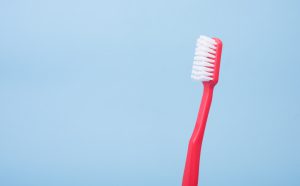Are We All Brushing Our Teeth Wrong?
Posted by: Charlie Burrows

Since we were children we’ve understood how to brush our teeth. However, are we actually brushing them properly or have we developed bad habits which are subsequently affecting our dental health?
Everyone remembers being taught to use a pea-sized amount of toothpaste (some use more than that) and brushing up and down, across and thoroughly, including cleaning the gums and tongue for a a recommended 2 minutes. But how many of us really brush for at least 2 minutes? It seems a long time and we probably don’t brush for as long as we should. But this isn’t the only thing we may not be doing right.
Brushing Angle
The way you brush can affect the health of your teeth and many people suffer a common problem which dentists identify upon regular visits; receding gums. The chances are that a lot of patients are in the category of gum disease because of vigorous brushing which has caused the gum to recede. This can then expose the nerves underneath and cause sensitivity and eventually permanent damage to the tooth. Dentists recommend small circular brushing motions and to go more gentle when brushing the gums. A sign you may be brushing too hard is soreness or swelling and red gums. The most common reason for over-brushing the top left gum is that right handed patients (the more common of the two naturally) will make a sawing up-motion with their right hand and it becomes too hard on the gum. This is a common occurrence seen throughout the dental industry.
Keep the Fluoride In
Fluoride is important as it protects you from tooth decay due to the remineralisation process. You can see here the benefits of fluoride but there is a common habit of patients rinsing their mouth before bed after brushing but all this does is wash away the fluoride from the toothpaste. The reason is probably because it can make you thirsty and your mouth dry but we recommend using a smaller “pea-sized†amount on your toothbrush. This should help with the urge to rinse too much.
It’s also recommended to only drink water after brushing before bed. Again, maybe a 15-20 minute gap between brushing and drinking is advised so as not to wash away the fluoride before it has time to settle but also, you should avoid drinking juices or hot drinks which could stain or remove the fluoride. This includes anything with sugar of course which should be avoided before bed, after brushing.
Brushing twice Daily
A recent American study showed that brushing twice daily with fluoride toothpaste (recommended anyway) will help lower the risk of cardiovascular disease. It was researching the effects of poor oral health on the overall health of up to 700 adults. The thought process was that because for many years there has been a known link from gum disease which can lead to diabetes and strokes, as well as potentially other health conditions, that poor oral health generally can impact other areas of the body and cause major problems resulting in conditions such as heart disease. This study was presented at the American Heart Association meeting in Chicago and comes in the wake of other studies linking poor oral health to medical problems.
Source of study information:Â https://www.heart.org/en/news/2018/11/07/bad-tooth-brushing-habits-tied-to-higher-heart-risk
Interdental Brushing
Recommended by dentists, interdental brushing can help clear debris and bacteria from the mouth in those harder to reach areas that toothbrushes can’t reach. Especially effective for those patients with gaps between teeth for example, interdental brushes can be purchased at different sizes and used to clean between teeth to remove food and debris. This should be done before brushing every night, rather than cleaning after you’ve brushed. The benefits of interdental brushing are many and it’s highly recommended to use them each night and in between dentist visits, even if you’ve had them cleaned. It can only take a day or two for food to build up and for bacteria to start forming in the mouth. Eventually, it can harden and create plaque which can cause other related issues. So keep your mouth clean with a little extra effort before bed, with interdental brushes.
- Sugar: A Plague for Athletes - 24th February 2020
- The Dangers of Illegal Teeth Whitening - 19th February 2020
- What is Gingivitis? - 23rd January 2020

